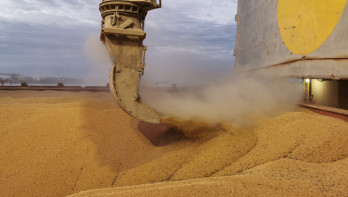Analysis Grains
Egypt faces major change in grain procurement
The wheat export from Russia picked up last week, as shown by the figures, and this was accompanied by a slight price increase. Gasc has long been the designated organization for grain import by Egypt. President Sisi aims to change this by making the military responsible for the import. There was also some anticipation of the Wasde report during the last trading session, which will be published tonight Dutch time.
The December contract for wheat on the Matif closed €3.50 higher at €220 per ton yesterday. The March contract closed a quarter lower on the Paris exchange at €227.25 per ton. Wheat on the CBoT closed 0.2% lower at $5.41¼ per bushel. Corn increased by 0.8 to $4.34 per bushel. Soybeans declined by 0.4% to $9.90 per bushel during the last trading session.
After a poor export performance in the last week of November, Russian exporters stepped up the pace in the first week of December, according to the latest SovEcon data. Russia exported 1.08 million tons of grain last week, of which 1.01 million tons were wheat. This was an increase from 630,000 tons the previous week, including 550,000 tons of wheat. With the increased demand, prices also rose slightly. Ikar raised the price for Russian Black Sea wheat by $2 to $228 per ton.
The fall of the Assad regime has not gone unnoticed by the Kremlin on several fronts. Bashar al-Assad has fled to Russia where he has been granted asylum. The head of the Russian Union of Grain Traders has other concerns. Syria is a buyer of grain from Russia, and exporters prefer not to lose the country as a customer. Additionally, there are outstanding payments from previous deliveries. Russia is therefore seeking cooperation with the rebels in Syria.
Grain Procurement by the Military
There are also rumblings at another major buyer of Russian wheat. The Egyptian state procurement agency Gasc is a well-known name in the grain trade. Gasc (General Authority for Supply Commodities) falls under the Egyptian Ministry of Supply. The agency is particularly known for the tenders it regularly issues, allowing foreign wheat suppliers to bid. Egyptian President General Sisi aims to transfer food imports to the Mostakbal Misr service, which falls under the Egyptian Air Force. This information reportedly comes from a letter Egypt sent to the Russian Ministry of Agriculture, as seen by Reuters. This action is not entirely unexpected. Companies linked to the military have thrived under Sisi, causing unrest among some businessmen in Egypt and foreign investors. Coincidentally, news services reported yesterday that Russia has started delivering 430,000 tons of wheat purchased directly by Gasc.
Positives in South America
In the grain trade, there was cautious anticipation yesterday for the December Wasde report, which will be released tonight Dutch time. According to a Reuters survey, the trade does not expect significant changes in the world ending stocks of wheat and soybeans. Due to strong demand for corn, the ending corn stocks may be slightly lower, according to survey participants. The trade anticipates a slightly larger soybean harvest for Argentina and Brazil in the Wasde report. The average soybean harvest is estimated at 51.35 million tons for Argentina and 169.3 million tons for Brazil. In the November edition of the Wasde report, the USDA estimated 51 million tons and 169 million tons, respectively.



